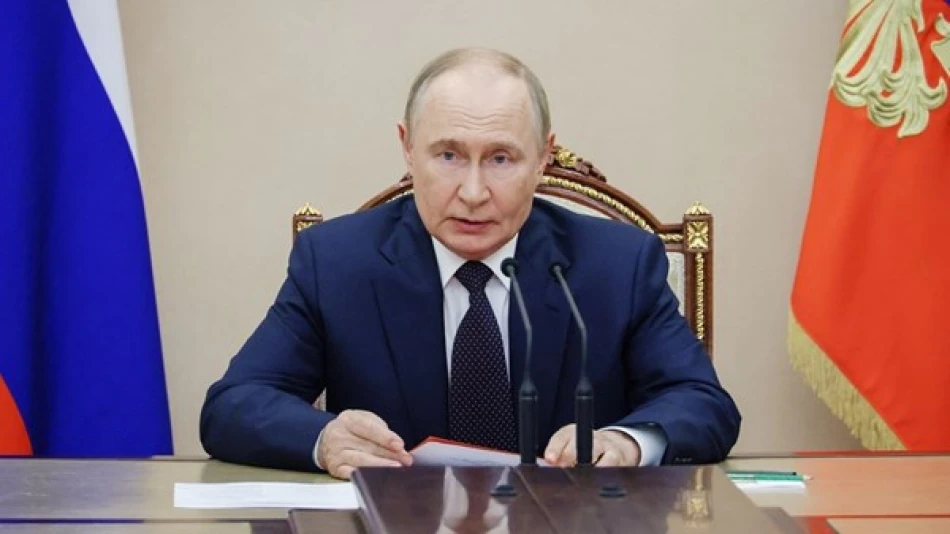
Putin Proposes Moscow Meeting with Zelensky to Discuss Diplomatic Resolution
Putin's Moscow Summit Proposal to Zelensky Faces Immediate Rejection as Trump Mediates Peace Talks
Russian President Vladimir Putin has proposed hosting Ukrainian President Volodymyr Zelensky in Moscow for potential peace negotiations to end the war in Ukraine, according to sources familiar with a phone conversation between Putin and U.S. President Donald Trump. The Ukrainian leader immediately rejected the proposal, signaling the deep challenges facing any diplomatic breakthrough nearly three years into the conflict.
The Diplomatic Gambit Behind Closed Doors
During Monday's phone call between Trump and Putin, the Russian president specifically mentioned Moscow as a potential venue for direct talks with Zelensky, according to sources who spoke to international media. Zelensky's swift "no" response underscores the fundamental trust deficit between the two leaders and highlights Ukraine's reluctance to negotiate on what it perceives as Russian terms.
The proposal represents Putin's latest attempt to position Russia as a reasonable party seeking dialogue, while potentially forcing Ukraine into an uncomfortable diplomatic corner. By suggesting Moscow as the venue, Putin may be testing both Ukrainian resolve and Trump's influence over Kyiv.
Trump's Mediator Role Takes Shape
The phone conversation marks one of Trump's first major diplomatic interventions since returning to office, fulfilling his campaign promise to broker an end to the Ukraine conflict. However, the immediate rejection of Putin's proposal suggests that Trump's path to a negotiated settlement will be far more complex than his campaign rhetoric suggested.
Strategic Positioning by All Parties
Putin's choice of Moscow as a meeting venue carries significant symbolic weight. It would represent a diplomatic victory for the Kremlin, potentially legitimizing Russia's position while placing Zelensky in the uncomfortable position of traveling to the capital of his country's aggressor. For Ukraine, accepting such terms could be seen domestically as capitulation before negotiations even begin.
Zelensky's immediate rejection demonstrates Ukraine's continued insistence on negotiating from a position that doesn't validate Russian territorial claims or political dominance. This stance aligns with Ukraine's consistent position that any meaningful talks must respect Ukrainian sovereignty and territorial integrity.
Historical Context and Precedent
The proposal echoes historical patterns where stronger powers attempt to dictate negotiation terms through venue selection. Similar dynamics played out during various Cold War summits, where location choices carried substantial diplomatic significance. Putin's suggestion follows Russia's playbook of appearing reasonable while maintaining advantageous positioning.
Previous attempts at Ukraine-Russia negotiations, including the early 2022 talks in Turkey and Belarus, ultimately failed due to fundamental disagreements over territorial concessions and security guarantees. The Moscow venue proposal suggests Russia remains unwilling to engage on neutral ground, potentially dooming talks before they begin.
Implications for Future Diplomacy
The exchange reveals the stark reality facing Trump's peace ambitions. Both Putin and Zelensky appear committed to maximalist positions that leave little room for compromise. Russia's insistence on favorable terms, combined with Ukraine's rejection of what it sees as surrender conditions, suggests any breakthrough will require significant shifts from both sides.
The failed proposal may actually serve Trump's longer-term strategy by demonstrating to both American and international audiences the genuine difficulties involved in brokering peace. This could provide political cover for a more extended diplomatic process while managing expectations about quick resolutions.
As winter fighting continues and military positions remain largely static, the diplomatic rejection in Moscow's favor may push future negotiations toward more neutral venues – potentially opening space for substantive talks that neither side can dismiss as predetermined outcomes.
Most Viewed News

 Layla Al Mansoori
Layla Al Mansoori






